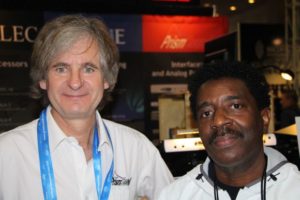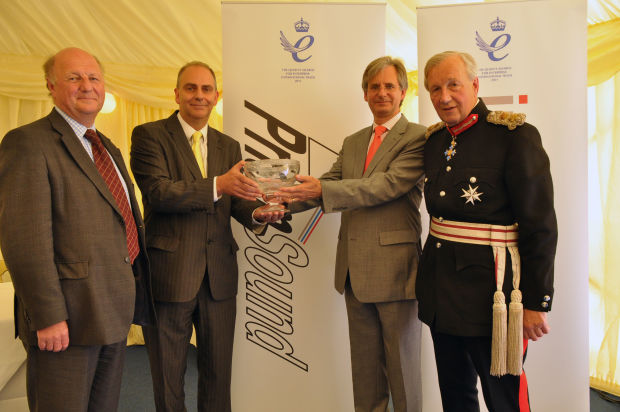
'We’ve stuck with audio, and that’s what we love': Graham Boswell talks 30 years of Prism Sound
Phil Ward talks to co-founder of Prism Sound Graham Boswell as the company passes the 30-year mark…
Everything that ever worried you about digital audio is probably true, so thank God for Prism Sound. If one theme unites the company’s 30 years of activity, it’s a kind of policing of the digital domain on behalf of audio professionals: how to get in; how to get out; how to spot the dangers lurking inside. Every binary digit has an alibi, and sometimes they need to be interrogated.
Graham Boswell and business partner Ian Dennis began this mission at pre-DSP, pre-AudioFile Neve in the early 1980s, before forming an R&D consultancy like private detectives hunting down missing audio quality. The move into manufacturing was made just in time to meet the march of Pro Tools and the rising tide of remastering as the industry reinvented itself, followed by a brief flurry of acquisition to flesh out the portfolio. Phil Ward spoke to co-founder Graham Boswell to find out more…
Congratulations. How are you?
Partly to celebrate my 60th year – which happened to clock round with the 30th anniversary of Prism – I’m doing the Outlaw charity half triathlon, so I’m keeping fit. Well spotted – Prism has been half my life.
So, you’re 30 years old and you invent a business called Prism. Why?
I came to the conclusion that I was unemployable! I’ve never had a proper job. I always worked as a contract engineer in electronic design, so I saw more diversity than stability. But it gave me very broad experience, and the ability to assimilate knowledge from several disciplines. Eventually there was a contract at Neve, which sounded like fun. I’d worked with ISDN, and floppy disks – that was my introduction to digital audio.
Why were you so itinerant?
I reckon it’s because I went to boarding school in Highgate, while my parents lived in Kuwait. People say how damaging and lonely that sort of schooling is, but we had a ball. You become very independent, not to say unmanageable. University suited me because I got up to no good at all – so much so that I had to finish my studies quickly, at night school, when the work started coming in. I did become chairman of the ‘Ents’ committee, which I used cynically to blag into clubs to see bands.
I was often envious of mates at school who were really good musicians, and I played a bit of guitar. A few years later one of them – a particularly good drummer – invited me to rehearsals with his band in London, but when I got there the place was empty. It had been cancelled without my knowledge, and I missed the opportunity. Who knows? Next time I saw him was on TV: it was Jon Moss, who later joined Culture Club.
I always got on better with my friends who were doing Social Sciences. I struggled with the engineering community. Politics matters, especially to young people, and when we were young, music was an important conduit to social awareness. I do feel that this connection dwindled in the ‘80s and ’90s, but I kind of hope it’s coming back. It used to be a collective engagement; the latter ways of consuming music are isolated – like video games – and there’s no sense of community to it. Nothing gets your blood flowing and your brain working quite like music, and I’d love to see that again.
How did Neve experience turn into Prism practice?
I wrote micro-controller code for modules that would sit in the DSP-1 console and provide the control surface – the first of its kind. There was a big buss connected to four CPUs, and even a Cathode Ray Tube screen display. Ian was there at the same time – much cleverer than me, always has been – and through various upgrades after the Motorola 56K came on the market we realised we could offer more flexibility as an outside resource. Plus, some of our upgrades for Neve could be sold as standalone products – Sony Music in New York bought our digital EQ section for something like $25,000! We’d developed it for the DTC mastering console, but Prism Sound Ltd now existed and we held the intellectual copyright. We paid for the R&D.

Is Pro Tools via ADA-8 still the industry standard?
Sting still has the same system, albeit upgraded. We’ve supported three generations of Pro Tools interfaces with the ADA-8, but the cashflow isn’t there in the recording business to sustain this kind of exotica beyond a few very wealthy users – Mark Knopfler being another. I can’t resist the old joke: how do you make a small fortune in the studio business? Start with a large fortune. We’ve moved on to new generations of interface, and other things, although the ADA-8XR is still a solid and popular choice
At NAMM we’re launching Verifile, which checks whether a recorded stream has been recorded intact. It doesn’t fix the errors, but it uses cryptography to embed data in the noise that tells you if every sample is accurate, and every sample is present. It doesn’t tick the ‘consumer delivery’ box like MQA [Master Quality Authenticated]; it simply reports on the integrity of a computer recording via any of our Lyra, Titan or Atlas interfaces. It’s a ‘post-converter’ product in more ways than one: it turns the attention away from the conversion process to the results, which should encourage better recording standards and remove time-and-money-consuming mastering fixes.
SADiE: how is the old girl?
She’s doing great! We’ve just upgraded Radio France to Version 6, and a lot of SADiE went into Media City in Salford. The BBC is increasing its usage everywhere, and we’re talking about expanding the licensing footprint across national radio. It is more difficult with more free DAW technology on the market, but broadcast professionals continue to want something specifically tailored to what they do. Also, what organisations like these need when they invest in an editing tool is support. Without that, it’s a non-starter. We strive to provide the best support possible.
Is object-based audio on your horizon?
I’d like to get more involved, especially in relation to broadcast applications. Mark Evans here at Prism helped with the recording of Roger Waters’ 2011 Wall concerts, which were simultaneously shown in theatres in immersive formats. Technology may have hit the recording industry hard, but at least that has brought back the emphasis on performance. We can contribute to that, and for me you cannot beat a talented musician performing before a live audience. It’s an amazing thing.
Are we in danger of over-commoditising pro gear?
No, I don’t accept that. Not all consumer business models suit us, but making products is really about building things that cost you less than last time while doing more. It’s not about making things that are more expensive. Prism hasn’t always achieved that – we’ve been obsessed with making better converters – but we’ve now reached a stage where we can move into a post-converter world. With our innovations we could have gone into chip production, because we’ve always improved on what was out there, but we didn’t. We’ve stuck with audio, and that’s what we love.
Source: mi-pro.co.uk



